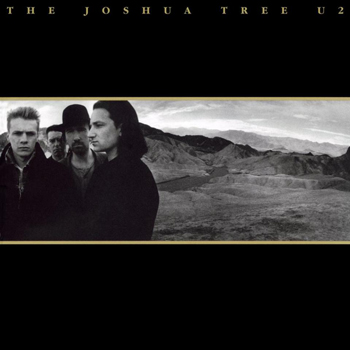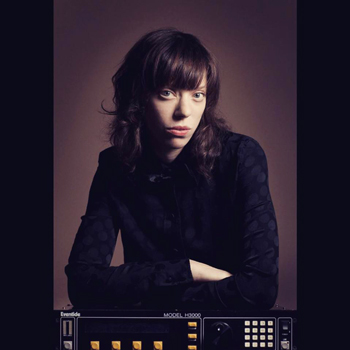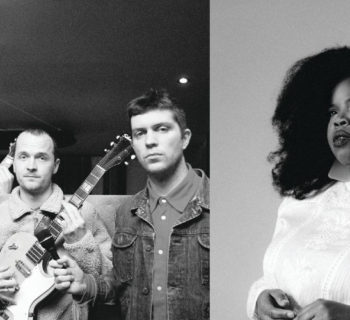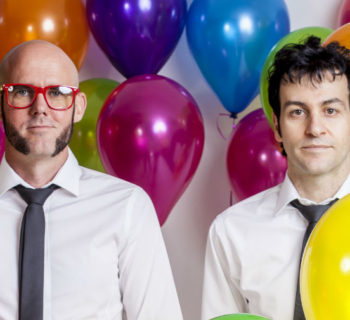Ester Ideskog is about to take you on a journey. The Swedish EDM singer, who goes by the stage name Vanbot, wrote, recorded, and produced her third album entirely in 17 days in a train car on the Trans-Siberian Railway, from Moscow to Beijing. Together with producer/mixer Johannes Berglund (FKA Twigs, Lykke Li) and Petter Winnberg, Ideskog created Siberia, an album that’s spontaneous and meditative, light and echoey. Ideskog’s siren-like voice adds an ethereal texture that softens the genre to gentle pop, rather than EDM.
Before Siberia’s release on April 7, Ideskog chatted with Rawckus about the challenge of writing and recording on the rails, overcoming doubts, and being force fed by Russian military officers.
Rawckus: How did you get the idea write and record an album on the Trans-Siberian Railway?
Ester Ideskog: That was actually a few years ago. I recorded an album in 2013, and I worked on it for so long—new productions, new lyrics, and everything—that after a while, it just felt watered out. So I trashed it when it was almost finalized. I just wanted to leave everything and go away and do music in another context. I think that’s why I found the idea of going on the railway. The way we did things [on Siberia] made it impossible for us to rework, polish, and get stuck in that spinning wheel.
Tell me about the technical challenges you faced making the album this way.
EI: We had prepared for the worst scenario, but everything worked out fine with the equipment. We only had light weight synthesizers, a drum machine, a sampler, and an 8-channel portable studio. So everything was easy to carry and battery driven, because we didn’t know if we’d have electricity on the train. I sang all the vocals on the journey, and you can hear a lot of other sounds, but I think that actually worked out pretty well. So yeah, there were difficulties but it didn’t really matter to us because we didn’t want perfection.
How did you pick Johannes Berglund and Petter Winnberg to work with you?
EI: Not everyone would do that, so I’m happy they wanted to jump on the train with me. Johannes and I worked together on my previous album [Perfect Storm]. He was the one I talked to about this idea, and luckily he was like, “Yes, of course we will do that!” I mean, he didn’t even ask a question like “Why would you do that?” It was Johannes who brought Petter on board, because he thought he would be perfect for this. It actually turned out to be the perfect group, the three of us.
What was the experience like living with your producers 24/7?
EI: Oh, that was...I haven’t thought about that! It worked though. Sometimes I really need just to be alone, and I did that. We weren’t in the compartment 24 hours because we went to the restaurant wagon, and when the train stopped we went out on the platforms and took a walk. We also made some stops along the way at the Lake Baikal and Mongolia, where we had separate bedrooms and some time off from each other. But that was just a few nights. Most of the nights, we slept in the same room on the train.
So how did you determine when to stop working? Was there ever a stop?
EI: We actually wrote and recorded music all day, but at night we would hang out with other passengers on the train—oil engineers, military officers, a rugby team, and other backpackers.
It was a magic night there, actually, going through Siberia and playing our music for the other passengers.
Your website mentions that you met Russian officers who fed you their own food.
EI: That was a new experience to us. They were very kind and generous but in a dominant way. They were very kind, but we couldn’t communicate by language, so they just fed us with chicken, eggs, potatoes, and vodka. We couldn’t say no! They just put the forks in our mouths!
So other passengers also had a big impact on your journey?
EI: I never expected that to be a significant part of the whole experience, but actually that turned out to be a very very good thing. Hanging out with other people and hearing about their impressions along the journey, and also meeting new cultures and people from other places in the world that you would never have met if you weren’t on this train. It was so interesting to sit down and talk. The things they said to us really kept me thinking. I took some of their words for my lyrics. When you’re traveling, you often end up pretty close with the people you meet. Because you’re probably never going to meet again, you can be totally open and honest with each other.
Were there any other memorable experiences you wish to share?
EI: One night we also had a small concert in the restaurant wagon in the middle of Siberia. It was so nice. We tried to talk to the restaurant wagon boss, and she was like “No, no, nyet, nyet.” It was impossible from the beginning, but after talking for a while and being kind to her she was so kind to us and let us play for the other passengers. It was a magic night there, actually, going through Siberia and playing our music for the other passengers. It was fun, and a very strange way of having a show.
Did you all face any mental or emotional challenges on the journey?
EI: There was one thing I thought about. I always come to a point where I’m like, “Oh my god what am I doing? Can I even do this? Who am I trying to fool? Am I even a songwriter? Am I even a singer?” For a few days on this journey, I had that same feeling, but the way we did things made it impossible to hang on to those thoughts. So I let go, and we continued working. However, the songs I wrote in during those days are closest to my heart.













